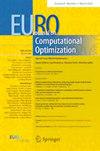拜占庭弹性随机梯度下降的简化收敛理论
IF 2.6
Q2 OPERATIONS RESEARCH & MANAGEMENT SCIENCE
引用次数: 1
摘要
在分布式学习中,中央服务器根据保存本地数据样本的节点提供的更新来训练模型。在存在一个或多个发送错误信息的恶意服务器(拜占庭对手)的情况下,用于模型训练的标准算法(如随机梯度下降(SGD))无法收敛。在本文中,我们提出了一种简化的收敛理论,适用于最初由Blanchard等人(2017)[3]提出的通用拜占庭弹性SGD方法。与现有的分析相比,我们在目标函数(可能是非凸的)的标准假设和随机梯度的灵活假设下证明了期望收敛到平稳点。本文章由计算机程序翻译,如有差异,请以英文原文为准。
A simplified convergence theory for Byzantine resilient stochastic gradient descent
In distributed learning, a central server trains a model according to updates provided by nodes holding local data samples. In the presence of one or more malicious servers sending incorrect information (a Byzantine adversary), standard algorithms for model training such as stochastic gradient descent (SGD) fail to converge. In this paper, we present a simplified convergence theory for the generic Byzantine Resilient SGD method originally proposed by Blanchard et al. (2017) [3]. Compared to the existing analysis, we shown convergence to a stationary point in expectation under standard assumptions on the (possibly nonconvex) objective function and flexible assumptions on the stochastic gradients.
求助全文
通过发布文献求助,成功后即可免费获取论文全文。
去求助
来源期刊

EURO Journal on Computational Optimization
OPERATIONS RESEARCH & MANAGEMENT SCIENCE-
CiteScore
3.50
自引率
0.00%
发文量
28
审稿时长
60 days
期刊介绍:
The aim of this journal is to contribute to the many areas in which Operations Research and Computer Science are tightly connected with each other. More precisely, the common element in all contributions to this journal is the use of computers for the solution of optimization problems. Both methodological contributions and innovative applications are considered, but validation through convincing computational experiments is desirable. The journal publishes three types of articles (i) research articles, (ii) tutorials, and (iii) surveys. A research article presents original methodological contributions. A tutorial provides an introduction to an advanced topic designed to ease the use of the relevant methodology. A survey provides a wide overview of a given subject by summarizing and organizing research results.
 求助内容:
求助内容: 应助结果提醒方式:
应助结果提醒方式:


